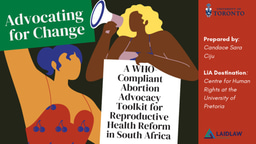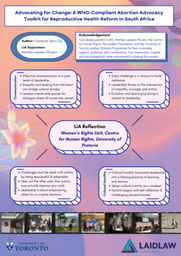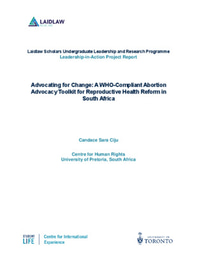LiA Week 4 Log - Leadership in Action
What went well?
This week has been incredibly enriching and fast moving, largely due to the Centre for Human Rights’ Short Course on Women’s Rights in Africa. Organised through the dedicated efforts of the Women’s Rights Unit, the course was a resounding success, bringing together nearly 60 participants from across the African continent. It was a powerful convergence of minds and missions, all united by a shared commitment to the advancement of women's rights.
Throughout the week, I had the privilege of engaging with a diverse array of individuals, including civil society organization officials, lawyers, UN officials, grassroots leaders, sexual and reproductive health and rights (SRHR) advocates, climate justice activists, academics, and students. These interactions were deeply meaningful. I had the opportunity to discuss my abortion advocacy toolkit with many of them, and the feedback and insights I received were thoughtful, relevant, and will undoubtedly shape the toolkit's future development in important ways. Each day of the short course focused on a different issue central to women's rights in Africa. Topics included Female Genital Mutilation (FGM), Conflict-Related Sexual Violence (CRSV), SRHR, and the rise of anti-rights and anti-gender movements on the continent. These discussions were not only informative but also deeply motivating. They opened my eyes to the scope and depth of the work being done and the resilience of those leading it.
I came away from this experience feeling more inspired and hopeful than ever about the future of women’s rights. Witnessing the passion, dedication, and innovation of so many people gave me a renewed sense of possibility. It also deepened my appreciation for the role of law, particularly human rights-based legal framework, in driving meaningful change. In fact, this week has made me seriously consider pursuing a supplemental law degree, either before or after my Master’s, to better equip myself for this work.
What could have been done differently?
One thing I could have approached differently was my time management during the Short Course week. Because the week was so packed with activities, sessions, and networking opportunities, I wasn’t able to make meaningful progress on the Advocacy Toolkit. Aside from the enriching conversations I had with both attendees and speakers, I didn’t manage to dedicate any focused time to the actual development of the toolkit. Looking back, I think I could have carved out at least 30 to 45 minutes at the end of each day to work on the toolkit. Even a small but consistent daily effort would have helped me spread out the workload and avoid the pressure of completing a large portion of it in Week 5. That said, I don’t have any regrets. Being fully present and 100% engaged in the Short Course allowed me to gain invaluable insights and form meaningful, long-lasting relationships. While I now need to make up for the time lost, the experience I had was deeply rewarding and well worth it.
What did I learn about myself when working with others?
For the longest time, I was hesitant about the idea of “networking.” I’m not sure if it was because I felt intimidated by what it seemed to represent or simply because it felt unnatural to me. I had always associated networking with being transactional, surface-level, and a bit performative. It seemed more about collecting contacts than building real connections.
However, this week, thanks to both the Short Course and the guidance of my Laidlaw Performance Coach, my perspective shifted significantly. I came to understand that networking doesn’t have to be forced or strategic in the way I had imagined. In fact, I realised that I had been “networking” all along without calling it that, every time I met new people, built relationships, and engaged in meaningful conversations, I was doing exactly what networking is meant to be. Once I reframed it in that way, I approached the Short Course week differently. Conversations began to feel more natural, and I found it much easier to speak with people I deeply admired. It no longer felt superficial. Instead, it felt like an exchange of ideas, curiosity, and genuine interest. This change in mindset made a significant difference, and I now see networking as something rooted in authenticity rather than obligation. With a newfound appreciation for networking, I even made my LinkedIn account!
What did I learn about leadership?
One of the most thought-provoking discussions during the Short Course focused on the global rise of anti-rights and anti-gender movements, particularly their increasing influence across Africa. The session explored how these movements, often rooted in conservative and extremist ideologies from the West and Europe, have become highly organised, transnational, and well-funded. We examined how they gain traction across African political and social spaces by hosting conferences, influencing legislation, and proposing bills, such as the recent attempt to decriminalize Female Genital Mutilation (FGM) in The Gambia.
Despite the damaging nature of their agendas, these groups demonstrate a level of coordination, legal lobbying, and strategic planning that is often lacking in some progressive spaces. At one point, the conversation shifted toward a difficult but necessary question: what can we, as human rights defenders, learn from their methods? How do they mobilise so effectively? What strategies do they use to gain political influence, build alliances, and secure funding?
This reframing challenged my previous assumptions about leadership within human rights work. I came to realise that effective leadership is not only about having strong values or being committed to justice. It is also about being observant, strategic, and open to learning, even from groups we deeply disagree with. Leadership involves a willingness to analyse and understand opposition tactics in order to strengthen our own. It calls for us to reflect on our own approaches to advocacy, budgeting, legal reform, and transnational organising.
Moreover, the idea that there might be value in engaging with individuals from opposing groups, such as inviting them into learning spaces like this Short Course, was a powerful takeaway. By understanding their worldviews and identifying points of possible persuasion, we create more opportunities to challenge and change harmful narratives. Leadership, in this sense, is also about bridge-building and fostering dialogue rather than simply operating within our own echo chambers.
What do I want to develop or focus on next?
By Week 5, I plan to finalize the Abortion Advocacy Toolkit. My goal is to produce two distinct versions: the first will be a text-based document that clearly presents all the necessary content. The second version will be a visually engaging and graphically designed toolkit, incorporating visuals and layout elements that make the material more accessible and appealing to a wider audience. I want to ensure that the toolkit is both informative and impactful, catering to different users' preferences and enhancing its effectiveness as an advocacy resource. At the end of the Week, I will submit it to the team for their feedback and comments before we officially launch it in Week 6.



Please sign in
If you are a registered user on Laidlaw Scholars Network, please sign in